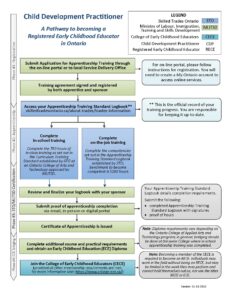Our child care programs, summer camp, and forest school are child-centered and inquiry based.
 If you’re ready to pursue your passion for nurturing young minds and become an ECE, apprenticeship might be the key. Today, we’re diving into an exciting avenue for career growth in the childcare industry. Let’s explore apprenticeship and the Child Development Practitioner Program.
If you’re ready to pursue your passion for nurturing young minds and become an ECE, apprenticeship might be the key. Today, we’re diving into an exciting avenue for career growth in the childcare industry. Let’s explore apprenticeship and the Child Development Practitioner Program.
If you’re currently working in childcare as an ECA (assistant) and thinking about obtaining your Early Childhood Education (ECE) certification, then you’re in luck. The Ontario Trades and Apprenticeship Program offers a fantastic opportunity. You can upgrade your skills and qualifications moving you closer to your goal of an ECE diploma while continuing to work in the field you love.
So, why should you consider this pathway? Let’s break it down:
Unlocking Opportunities
Professional Development and Career Advancement
For childcare professionals embarking on the journey to obtain ECE certification, the pursuit goes beyond personal and professional growth. Certification opens doors to enhanced financial stability and exciting opportunities for career advancement within the early childhood education sector.
Enrolling in the correct training program is a critical first step.
While some individuals are ready to enroll in ECE courses full-time, that option is simply not viable for everyone. Financial and personal responsibilities may dictate that interested candidates can only attend courses part-time. The Child Development Practitioner certificate, which is achieved through an apprenticeship program at a participating college, may be the perfect solution.
Maintain Current Employment
According to the George Brown College website, the Child Development Practitioner course was designed specifically for individuals who are working or have previously worked in the field of early childhood education and wish to obtain a formal education in childcare.
Course Requirements
Apprentices must take 23 in-class/hybrid evening courses that can be completed part-time while maintaining their regular employment. Childcare work experience can count toward the on-the-job training requirement. Courses will include instruction in various subjects such as child development, curriculum, health, safety, nutrition, and professional practice. Once the Child Development Practitioner certification is achieved, only a few more courses are a required to obtain an ECE diploma.
Educational Assistance and Funding
There’s no better time to consider enrolling in an apprenticeship program! The government of Ontario is also providing grants to support the education and development of ECE professionals.
Depending upon eligibility and qualifying criteria, Ontario grants may offset the entire cost of any program and program materials incurred by the student.
Career Opportunities
Childcare professionals, armed with their ECE diploma and their practical experience gained prior to and during the apprenticeship program, and registered with the College of ECEs, position themselves as strong candidates for supervisory or managerial roles within childcare centres. Whether aspiring to become a childcare centre supervisor, program coordinator, or director, ECE-certified professionals have the knowledge, skills, and credentials to take on key leadership positions. ECE professionals make a meaningful impact on the operations and quality of care provided.
 Beyond traditional managerial roles, ECE-certified professionals may also explore other opportunities for professional development and specialization within the childcare industry. From pursuing additional certifications in areas such as special education or child development, to taking on roles as mentor teachers or curriculum specialists, there are many avenues for growth and advancement to those with ECE certification. These opportunities not only enrich the careers of childcare professionals but also contribute to the ongoing improvement of childcare practices and standards.
Beyond traditional managerial roles, ECE-certified professionals may also explore other opportunities for professional development and specialization within the childcare industry. From pursuing additional certifications in areas such as special education or child development, to taking on roles as mentor teachers or curriculum specialists, there are many avenues for growth and advancement to those with ECE certification. These opportunities not only enrich the careers of childcare professionals but also contribute to the ongoing improvement of childcare practices and standards.
Alongside career advancement comes the promise of increased earning potential. Supervisory and managerial roles within childcare centres typically come with higher salaries and additional benefits and ECE-certified professionals have more opportunity to achieve greater financial stability and security for themselves and their families.
Improved Compensation
Recognizing the invaluable role that Registered Early Childhood Educators (RECEs) play in education, the Ontario government has taken proactive steps to address wage disparities and elevate the status of early childhood educators. As part of the Canada Wide Early Learning and Child Care (CWELCC) funding agreement, increased funding has been directed towards improving wages for RECEs, an important first step to ensuring that these dedicated professionals are more fairly compensated for their essential work.
Childhood Development Practitioner Apprenticeship Process
Interested candidates are encouraged to:
- Research the apprenticeship program by visiting the skilled trades portal
Child Development Practitioner – Skilled Trades Ontario or https://www.ontario.ca/page/start-apprenticeship
- Apply for the apprenticeship program

- Enter into a training agreement with sponsor (employer)
- Enroll in an appropriate program offering a Childhood Development Practitioner course
- Complete in-school and on-the-job training requirements
- Submit proof of completion of apprenticeship and receive Childhood Development Practitioner certificate
- Complete additional courses/requirements to achieve ECE diploma (Additional requirements vary depending on the program in which you are enrolled. At Seneca Polytechnic for example, obtaining an ECE diploma requires an additional 3 general education courses and a fourth specified course.)
- Register with the College of ECEs
Choosing the Right College Program
When selecting a college program for ECE certification, consider factors such as program accreditation, curriculum content, and practical training opportunities. While there are several college programs available in Ontario, some may offer specialized courses or partnerships with childcare centres, making them better suited for aspiring ECE professionals already working in the field.
Researching programs and speaking with students can help you decide which college supports your goals and learning preferences. Most colleges offering ECE courses also offer a child development practitioner course. Colleges like Seneca Polytechnic, George Brown, Mohawk, Fanshawe, and Durham offer pathways to this certification to name just a few.
The Employers Role
Supporting Our Apprentices
 Our childcare centres thrive when our teams are motivated, skilled, and committed to their profession. Offering support for employees to pursue ECE certification through apprenticeship, invests in today’s quality of care and ensures future success.
Our childcare centres thrive when our teams are motivated, skilled, and committed to their profession. Offering support for employees to pursue ECE certification through apprenticeship, invests in today’s quality of care and ensures future success.
Our experienced staff members play a vital role in maintaining continuity and consistency in care delivery. Their expertise and institutional memory are invaluable assets that contribute to the overall stability and effectiveness of the organization. If you’d like to know more about career opportunities at Upper Canada Child Care, check out our careers page here.
However, supporting employees in pursuing ECE certification isn’t just about meeting regulatory requirements. It’s about investing in the future of UCCC by fostering a positive work environment and the ongoing delivery of high-quality care. So, we take our role as sponsor very seriously. We ensure that apprentices receive all the necessary on-the-job training and mentorship to satisfy the requirements of the program.
For childcare professionals looking to achieve necessary accreditation to further advance their careers, the Ontario Trades and Apprenticeship Program offers an important option, unlocking new pathways to professional success and higher compensation.
At the same time, childcare providers are offered a strategic opportunity to invest in their workforce, retain experienced employees, and prevent the loss of valuable talent. For Ontario families, it means higher quality care and added peace of mind knowing that their children are in qualified and caring hands.
So, what are you waiting for? Learn more about this fantastic program today!
By Marjorie LePoidevin, Director Communications and Marketing